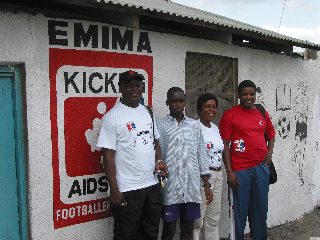All It Takes Is A Ball
All it takes is a ball. And it doesn’t even have to be a fancy leather Adidas-designed soccer ball. To make a functional ball, all you need is paper, plastic, and the right skills.
You also need some people. Even though soccer is normally played with two teams of eleven players, you can play a good game with just a few people.
While individual skills are important, the teamwork required to move the ball across the field calls for a range of skills, body types, and strengths.
Since June 11th, soccer fans around the world—myself included—have had the joy of watching the FIFA World Cup. And yesterday we all sat riveted as Spain and the Netherlands played into extra time.
Soccer is the most widely watched sport in the world. More than 2.7 million spectators had the pleasure of watching games in stadiums across South Africa—the first time an African country has hosted a major international sporting event of this magnitude. And more than a billion people across the globe tuned in on their TVs and computers in their homes, schools, sports clubs, local convenience stores, and bars.
You can’t match the passion of soccer fans. They simply love this game. With great fervor and loyalty, they coach, cheer, and jeer. And when they lose, they cry.
In South Africa, fans have learned to express their elation using the sounds of the vuvuzela, a plastic horn that makes a distinctive sound.
Across race, class, and culture, the love of the sport brings people together. Ethnic divisions fade into the background when a national team represents a country on the regional, continental, and global stages.
So I’m sure that the thousands of youth who participate in Firelight grantee EMIMA’s programs were among those who tried catching a game whenever and however they could.
It’s quite likely that most of them don’t have a TV at home. But a TV at a local store or the local sports club works just fine.
Founded in 2001, EMIMA (Elimu Michezo Na Mazoezi or ”education, physical activities, and sports” in Swahili) uses sport as a tool for development and youth engagement. Like many other Firelight grantee-partners, EMIMA runs sports-based activity programs that advance HIV/AIDS awareness, gender equality, and sexual reproductive health. Their approach also helps youth gain confidence and self-esteem.
What started as a small voluntary youth organization running boys’ and girls’ soccer teams in two of Dar es Salaam’s poorest communities has grown into an organization that operates eight centers across Dar and three more centers in other regions of Tanzania. EMIMA’s school-based centers engage youth in a range of sports and recreational activities, including soccer, basketball, netball, volleyball, dance, drama, music, and arts and crafts.
Not only is soccer a fun and exciting way to bring people together, it also provides opportunities to influence knowledge and behavior through meaningful mentoring relationships between players and coaches. EMIMA’s trained peer leaders develop safe spaces for youth to build a sense of belonging as they traverse one of the most challenging stages of growing up: adolescence. Young people discuss sensitive subjects around sexuality, making positive choices, healthy living, and HIV/AIDS.
Soccer also lends itself to teaching youth important life skills: leadership, teamwork, trust, decision-making, competition, and communication. In addition, the young people get rigorous and physical exercise, which contributes to both their physical and mental health.
 Through EMIMA’s sports programs, youth also learn leadership skills and are trained as peer leaders to mentor other young people. Over the years, some of the most successful individuals have advanced through the organization to take up positions as coaches and staff members.
Through EMIMA’s sports programs, youth also learn leadership skills and are trained as peer leaders to mentor other young people. Over the years, some of the most successful individuals have advanced through the organization to take up positions as coaches and staff members.
When they noticed that they were not reaching girls, EMIMA added a leadership skills training and economic empowerment program specifically targeting girls. They have also expanded their program to include education support for youth and peer leaders who come from families who could not afford to keep them in school.
EMIMA’s young people also have a chance to compete in the East Africa Cup, a regional tournament that includes teams from other regions of Tanzania, Uganda, Kenya, and the Sudan.
Just like in the World Cup, each and every team starts out with the hope that they will have the glory of winning the championship. Through luck, skill, and tenacity, the teams make it through each stage and the players benefit from playing the sport in so many different ways.
For those who lose—whether on the world’s stage or in the lesser-known East Africa Cup—losing graciously is an important life lesson: there is no reason to lose hope because there is always the dream of winning the next tournament.

